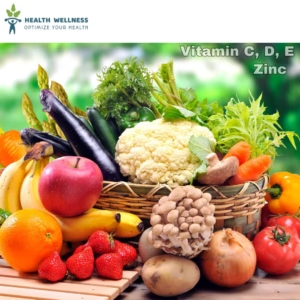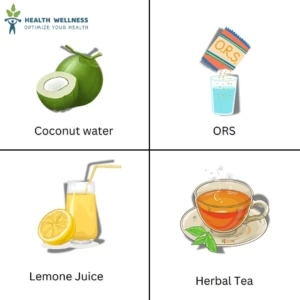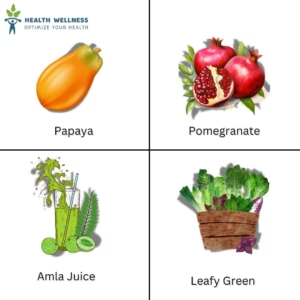Dengue fever does more than raise your body temperature. It can dangerously lower your platelet count and cause severe complications without proper management. Your diet becomes a vital part of recovery and helps maintain strength throughout the illness.
The right nutrition helps boost your immune system and keeps you hydrated while fighting dengue. It’s a good idea to drink 8-10 glasses of water every day. Foods that boost platelets like papaya and pomegranate make a big difference. Our facility’s medical staff has noticed proper nutrition’s impact on recovery periods. They’ve observed that patients who eat a well-rounded diet, including enough protein, vitamin C, and iron tend to bounce back more .
This detailed guide will show you the best foods to eat and avoid during each dengue fever stage. These recommendations will give you the best chance for quick recovery.

Getting to Know Dengue Fever and What to Eat
When you get dengue fever, your body experiences major shifts altering what it needs nutrition-wise. The dengue virus creates unique needs in your system. You just need specific dietary support to recover. Many of my patients struggle because they don’t understand these connections.
Dengue’s effect on your body’s need for nutrients
Dengue fever puts your body under tremendous stress as it fights the viral infection. Your immune system works overtime. It just needs more energy and nutrients than usual. Good nutrition is vital not just to feel comfortable, but to give your body the resources to curb the virus.
Research shows that nutrition is a vital factor in how well the immune system works in dengue patients. A well-balanced dengue fever diet supports immune response, maintains energy levels, and helps repair tissue. What you eat really matters for recovery.
Your nutritional status before getting infected plays a surprising role in how the disease progresses. This is a big deal as it means that overweight children had a 1.76 times higher risk of getting severe dengue compared to normal-weight children. But undernutrition sometimes helps protect against severe symptoms.
These micronutrients deserve special attention in a dengue fever diet:

- Vitamin C: Supports higher platelet counts and shorter hospitalization
- Vitamin D: Associated with lower likelihood of progressing to dengue hemorrhagic fever
- Vitamin E: Improves clinical and hematological parameters, including platelet counts
- Zinc: Contributes to shorter hospital stays
I always recommend specific dengue treatment foods rich in these nutrients to my patients. These dietary components don’t just make you feel better – they actively help your body fight the virus.
The science behind platelet reduction in dengue
Thrombocytopenia (low platelet count) ranks among the most common and concerning symptoms of dengue fever. Learning about this process explains what to eat to increase platelets during dengue.
Platelet counts start dropping around day 2 of infection and stay low until days 6-7. They can drop enough to cause life-threatening bleeding complications. The mechanisms behind this reduction get complicated.
We noticed two main ways dengue affects platelets. The virus can directly infect megakaryocytes (cells that produce platelets in bone marrow). This kills the cells and reduces platelet production. The virus also triggers excessive platelet activation and destruction in the bloodstream.
On top of that, it activates platelets and releases inflammatory cytokines that increase endothelium permeability. This activation makes platelets show higher levels of P-selectin and annexin V, which are markers of platelet activation and cell death.
Doctors can predict recovery using the Immature Platelet Fraction (IPF). When IPF values go above 8%, platelets usually recover within 24-48 hours. This helps doctors decide if platelet transfusions are needed.
A diet for dengue patients should focus on foods that help make platelets. Foods rich in vitamin K (like broccoli), iron-containing foods (such as pomegranate), and vitamin A sources can help increase and maintain platelet levels.
Staying hydrated is crucial because dengue-induced fever can cause major fluid loss. This makes platelet function and overall recovery more difficult. These factors are the foundations of an effective dengue fever diet for patients.
Phase 1: Diet During Acute Fever Stage (Days 1-3)
The first 72 hours of dengue fever bring unique challenges. Your body fights high fever, possible nausea, and starts reducing platelets. A targeted diet during this vital phase can affect how well patients handle symptoms and stay strong.
Hydration strategies when fever is highest

Your body needs proper hydration during the acute fever stage. High temperatures lead to heavy sweating and fluid loss that can cause serious dehydration. You need 8-10 glasses of water daily to keep your body working and manage fever.
Water alone won’t do the job. Your body needs electrolytes to maintain fluid balance. Here’s what I suggest:
- Coconut water: A natural source of electrolytes that’s easy on the stomach
- Oral Rehydration Solution (ORS): Helps restore lost electrolytes, especially if you’re throwing up
- Homemade electrolyte drinks: Mix water with a pinch of salt, sugar, and lemon juice
- Herbal teas: Chamomile or peppermint teas give you soothing hydration without caffeine
Medical guidelines suggest a structured approach for children or people who struggle with fluids. People weighing between 30-50 kilograms should take fluids double their weight in milliliters per hour. Keep track of your urine output—it should match your body weight in kilograms per hour.
Easy-to-digest foods for nausea management
The acute phase often brings nausea and poor appetite. Your digestive system needs gentle, simple nutrition. My patients recover faster when they eat:
Soft, simple carbohydrates – These give you energy without stressing digestion:
- Rice porridge or khichri (rice and lentil porridge)
- Mashed potatoes
- Soft-cooked oatmeal or other gruels
Light, warming liquids – These nourish and hydrate:
- Clear vegetable or chicken broths
- Plain soups without heavy cream or spices
Small, frequent meals work better than large ones. Pay attention to your body’s hunger signals. Don’t force yourself to eat if you feel sick, as this might make you throw up and get more dehydrated.
What to eat in dengue to increase platelets initially

Some foods can help support your platelet production and maintenance early on. Here’s what works best:
Papaya – Contains enzymes like papain and chymopapain that boost immune function and may help produce platelets. The fruit itself (not papaya leaves) is easy to digest and gentle on your stomach.
Pomegranate – Has iron and antioxidants that help maintain healthy blood cell counts, including platelets. Fresh juice works best during this phase.
Easily digestible vitamin C sources – Vitamin C helps your immune system and possibly platelet health:
- Amla (Indian gooseberry) juice mixed with water
- Fresh orange juice (if your stomach can handle it)
Light green vegetables – Steamed or in clear soups:
- Spinach
- Cucumber
- Carrots
Stay away from fatty, greasy foods, caffeine, alcohol, and spicy dishes during this first phase. These can upset your stomach and make symptoms worse. Also avoid raw foods that might carry germs your weakened immune system can’t fight.
This acute phase needs rest and proper nutrition. The right diet in these first critical days helps build a strong foundation for recovery.
Phase 2: Critical Period Nutrition (Days 4-6)
The critical period of dengue fever hits between days 4-6. Your platelet count drops to its lowest point and plasma leakage becomes a serious concern. Most of my patients feel their worst during this time, but good nutrition plays a vital role in recovery.
Foods that support platelet regeneration
Your platelet counts keep dropping, but the right food choices can help regenerate them naturally. Your body needs iron-rich foods to keep blood hemoglobin levels up and make platelets. These platelets help your blood clot – a process that dengue often disrupts.
Here’s what I recommend:
- Pomegranate: Packed with iron and antioxidants that keep platelet counts healthy and boost your immunity
- Papaya: Has enzymes like papain and chymopapain that help digestion and boost platelet count
- Kiwi: Full of vitamin C, vitamin E, vitamin K, folate, and potassium that boost immunity and platelets
- Leafy greens: Spinach and kale pack vitamin K that helps blood clot and make platelets
Vitamin K plays a key role in improving platelet count. You’ll find it in broccoli, cabbage, spinach, avocados, and lean meats—all great additions to your dengue recovery diet.
Balancing electrolytes during the critical phase
Without proper management, fluid leakage during this phase can lead to shock, organ failure, and possible death. Electrolyte problems are common too – 22% of patients have low sodium and 26% have low potassium.
To keep your electrolytes balanced:
Drink plenty of fluids like water, coconut water (rich in natural electrolytes), clear soups, and rice porridge with potassium, calcium, sodium, and magnesium.
Try ORS (Oral Rehydration Solution) packets or make your own with water, salt, sugar, and lemon juice.
The critical phase usually lasts 24-48 hours. You need to balance your fluids and electrolytes carefully. Too much fluid can cause breathing problems from fluid buildup in your lungs.
Protein sources that help recovery
Your body needs a lot of protein during days 4-6 to fix damaged tissues and support your immune system. Since appetite stays low, easy-to-digest proteins work best.
Vegetarians can try:
- Tofu: Gives you protein without feeling heavy like meat
- Paneer: Easy-to-digest dairy protein
- Yogurt: Offers protein plus helpful probiotics
Non-vegetarians can opt for:
- Soft-boiled eggs: Complete protein that’s easy on your stomach
- Well-cooked lean meats: Chicken or fish, cooked plain
- Bone broth: Gives you protein and keeps you hydrated
This critical period needs a careful balance of foods that boost platelets, maintain electrolytes, and provide protein—all while being gentle on your stomach. These dietary guidelines will help your body fight through this tough phase of dengue recovery.
Phase 3: Recovery Stage Diet (Days 7-14)
Your body starts recovering by day 7, but you still need good nutrition to rebuild strength and get your platelet count back to normal. The right diet at this stage helps replenish nutrients as you slowly get back to normal eating.
Rebuilding strength with nutrient-dense foods
Once your appetite returns, focus on foods packed with nutrients that help your body heal:
- Protein-rich foods: Your body needs protein to repair damaged tissues. Soft-boiled eggs, tofu, paneer, and well-cooked lean meats help rebuild muscle strength.
- Energy-dense options: Easy-to-digest carbs like khichdi, daliya (broken wheat porridge), and rice keep your energy levels up.
- Iron-rich foods: Pomegranate, dates, and apricots boost red blood cell production and improve platelet count.
Antioxidant-rich foods play a key role in repairing cells damaged during infection. Colorful vegetables like carrots, beetroot, and pumpkin have nutrients that boost platelet levels and cleanse your body.
Slowly getting back to normal foods
Your diet should expand gradually as you recover:
Eat small meals more often instead of three big ones. This helps your digestive system cope while giving you steady nutrients throughout the day.
Most patients can start eating normal foods between days 10-14. Some key points to remember:
- Choose whole, unprocessed foods over processed ones
- Keep eating platelet-boosting foods like papaya and pomegranate
- Drink enough water (8-10 glasses daily)
- Pay attention to your hunger signals and adjust how much you eat
Probiotics make a big difference during recovery. Yogurt (dahi) has good bacteria that protect your gut from harmful ones. Try to eat about 150 grams each day.
Supplements that might help you recover faster
New research shows some supplements can help recovery:
Vitamin C might boost platelet counts and get you out of the hospital sooner. Vitamin D could lower your risk of dengue hemorrhagic fever, while vitamin E improves various health markers.
Zinc might help reduce hospital stays. These supplements are simple additions to regular medical care.
A balanced approach might include these supplements in your dengue treatment food plan. Just check with your doctor before taking any supplements.
Note that dengue recovery takes time—usually 7-14 days for simple cases. The right diet helps speed up healing so you can get back to your normal life stronger and sooner.
Foods to Completely Avoid Throughout Dengue Recovery
What you eat during dengue recovery is just as vital as what you avoid. Poor food choices can slow down your healing and make your recovery take longer.
Why certain foods worsen dengue symptoms
Dengue infection makes your digestive system very sensitive. Fatty and greasy foods strain your weakened system and can make nausea and digestive problems worse. Your body needs extra energy to digest fast food, fried items, and heavy meats. This takes away resources needed to fight the virus.
Spicy foods can be harmful because they irritate your stomach lining and make nausea worse. Hot peppers and spicy seasonings might damage your stomach lining and create ulcers that make recovery harder.
Caffeinated beverages make you lose water through increased urination. This works against your need to stay hydrated and might make your platelet function worse – a key concern in your dengue fever diet.
Common dietary mistakes that delay healing
Drinking alcohol during recovery is the most common mistake patients make. It dehydrates you and stops your immune system from fighting the infection effectively. Of course, you should avoid all alcoholic drinks completely.
There’s another reason to be careful – processed foods high in sugar and unhealthy fats. These only give you empty calories without the nutrients you need to regenerate platelets and repair tissue.
Many patients don’t realize that taking NSAIDs like aspirin, naproxen, and ibuprofen can be dangerous. These medicines might increase bleeding risk or prevent clotting when platelet counts are already low.
Alternatives to foods that hinder recovery
We replaced fried foods with steamed, boiled, or baked options. Instead of heavy meats, try lighter protein sources like:
- Soft-boiled eggs
- Tofu or paneer
- Well-cooked lean chicken
You can swap caffeinated drinks for herbal teas, coconut water, or plain water with lemon. Natural fruit juices (diluted if needed) work better than sugary drinks.
Mild herbs add flavor without irritation, unlike spicy seasonings. A little ginger can add taste and help with nausea without the risks of spicy foods.
Your food choices during dengue recovery will determine how fast you get back on your feet and return to your normal activities.
Conclusion
Dengue fever recovery just needs careful attention to nutrition during each phase of the illness. My experience with treating many patients shows that the right dengue fever diet can substantially speed up recovery time and help prevent complications.
Your dietary choices affect platelet counts, immune function, and overall healing. Simple changes make a real difference in recovery outcomes. These include drinking enough fluids, eating platelet-boosting foods like papaya and pomegranate, and staying away from harmful items such as spicy or fried foods.
Note that your body’s recovery happens step by step – most patients take 7-14 days to return to their normal activities. During this time, proper hydration and nutrient-dense foods support your body’s healing process. Dengue can be tough, but the right nutrition strategy gives you the best chance for a smooth recovery.
FAQs
Q1. What are the best foods to eat during dengue recovery? Focus on hydrating fluids like water, coconut water, and clear broths. Include fruits such as papaya, pomegranate, and kiwi, which are rich in vitamins and can help boost platelet count. Lean proteins like chicken, fish, and eggs are also beneficial. Vegetables, especially leafy greens and broccoli, provide essential nutrients for recovery.
Q2. Which fruits are most beneficial for dengue patients? Fruits rich in vitamin C and antioxidants are particularly helpful. Papaya is known for potentially increasing platelet count. Other recommended fruits include pomegranate, kiwi, watermelon, oranges, and bananas. These fruits provide hydration, essential vitamins, and minerals that support the immune system during recovery.
Q3. Is it safe to eat rice when recovering from dengue? Yes, soft, boiled rice is a good option for dengue patients. It’s easily digestible and provides energy. For a balanced meal, you can pair it with lentils or light curries. However, always listen to your body and adjust your diet based on how you feel.
Q4. What should I avoid eating during dengue recovery? Avoid foods that can strain your digestive system or interfere with recovery. These include fried and fatty foods, spicy dishes, refined carbohydrates, and sugary items. Also, steer clear of alcohol and caffeinated beverages as they can lead to dehydration. High-sodium foods should also be limited.
Q5. How should I approach nutrition during different stages of dengue? In the early stages, focus on hydration and easily digestible foods. As you progress, gradually introduce more nutrient-dense options to support platelet regeneration and overall recovery. Throughout all stages, maintain proper hydration, eat small, frequent meals, and include foods that boost platelet count. Always consult with a healthcare professional for personalized dietary advice.

